
Barefoot Gen (1983)
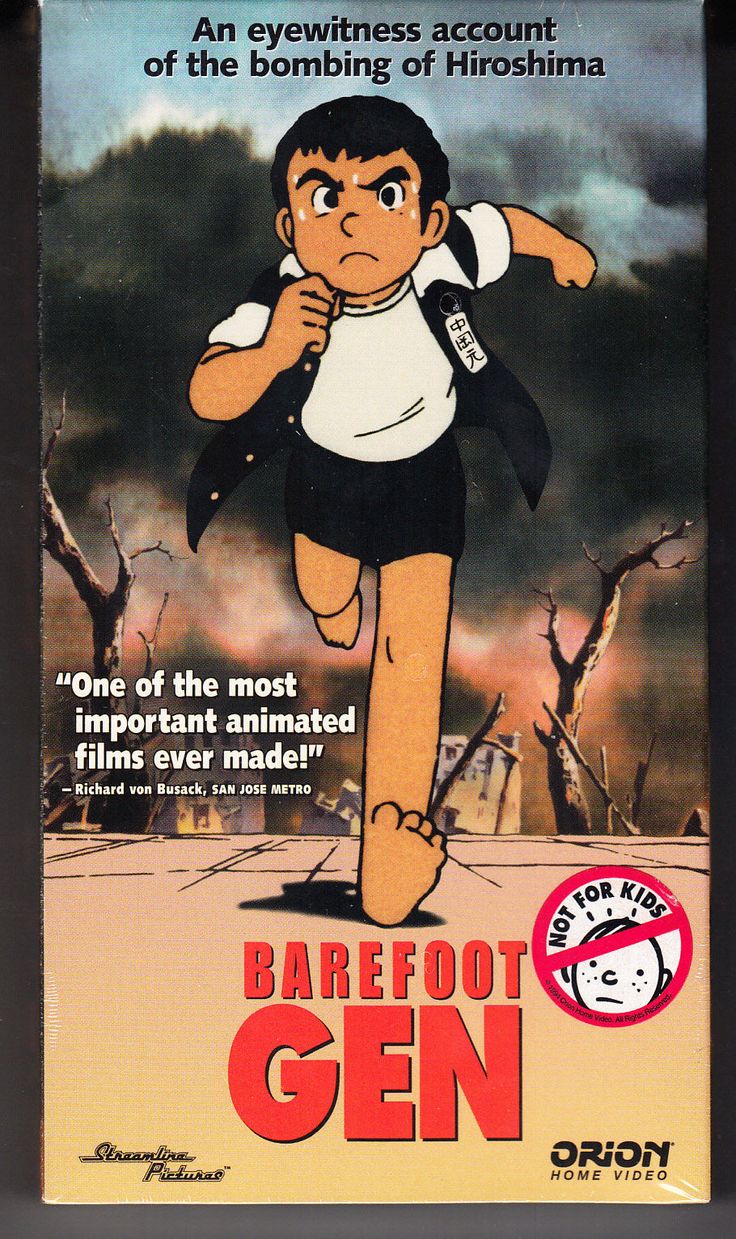
THE TRAILER
Youtube has no trailers for this that I can find. I could’ve posted the scene where the bomb falls but that would’ve been a dick move.
THE DIRECTOR
Mori Masaki
THE ACTORS
Issei Miyazaki (Gen), Yoshie Shimamura (Kimie), Masaki Koda (Shinji/Ryuta)
THE CAUSE
Nuclear Attack
THE STORY
“It is the summer of 1945, three and a half year after the war between the Allies and Japan began. Despite initial successes the Japanese have seen the tide of battle turn against them. The Americans have leapfrogged across the Pacific sweeping the Japanese before them. Japan’s imperial fleet has been neutralized, it’s air force overpowered. From the island air bases they now control the American’s B-29 Flying Fortresses are able to strike at the Japanese home islands. A systematic firebombing campaign is launched against the cities and industrial centers. It is the most devastating attack against civilian targets ever carried out. Meanwhile, in America… Robert Oppenheimer and other scientists have spent three years working in secrecy to develop a new type of bomb. They have at last succeeded. But their achievement is not yet known to the world and certainly not to the citizens of Hiroshima in the summer of 1945.” – Opening narration.
THE RUNDOWN
When I started this column I had to figure out a way to decide what was and wasn’t appropriate subject matter to write about. My first thought was that I was going to do only pure post-apocalyptic stuff which seemed easy but was a bit harder to quantify when I got to thinking about it. So post-apocalyptic means the world ends, yeah? But what does that mean? Does that mean the world is gone? Or does that mean society is gone? But a lot of post-apocalyptic movies have socieities either still running or new ones have sprung up. So I instead opted to go post-apocalyptic and dystopian because they have one thing in common, they depict an event or events that have forever altered the world/universe in a negative way.
That was my way of telling you, in a roundabout way, that I know that Barefoot Gen isn’t post-apocalyptic. The story is of a young boy living in Hiroshima on the fateful day that the first atomic bomb was dropped and the horrifying hardships he faced as a result. Gen is based on Keiji Nakazawa, who wrote the manga on which this movie was based. Obviously I know that the world didn’t end in 1945 and while I could make an easy political joke about how we’re living in a dystopia currently, my exscuses are that A) the invention and deployment of the first atomic bomb most certainly altered the world we live in in a negative way, and B) the subject matter involved has the feel of many of the movies I have and will cover in this column and I think it’s a noteworthy film to speak of because unlike the other stories of people living in post-nuke environments I cover here, this one actually happened. With that said, I do not believe I shall be covering any other films dealing with the Hiroshima or Nagasaki bombings, nor even this movie’s own sequel.
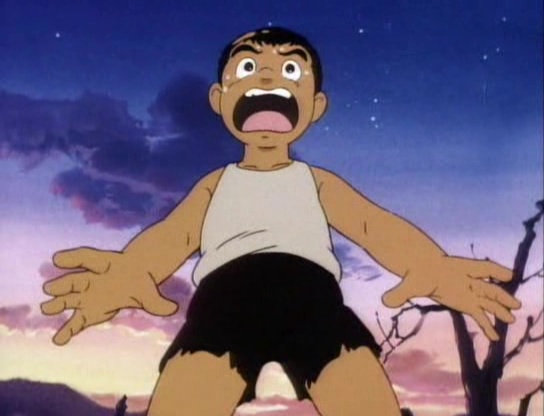
Fair warning: Since this movie depicts events that actually happened, I am not going to avoid spoilers at all. Skip to the text below the fourth picture if you want to avoid them.
We open on the summer of 1945 as Gen and his family crouch in a bunker as bombers fly overhead. The planes are frequent visitors and Gen and his family have largely come to consider them a nuisance as the city has not been bombed, but a little girl was shot to death by a fighter plane so they still take the air-raid sirens fairly serious.
The film takes its time getting to the actual bombing, showing the climate of Hiroshima in 1945 to already be pretty grim to begin with. It’s unclear how long our characters have gone without food but it’s at least been a day or two, and they certainly haven’t had a proper meal in quite some time. Soup is given to people with ration stamps but there are only so many and the demand far outweighs the supply.
When Gen’s mother Kimie (who is very pregnant) becomes bedridden from malnutrition, he and his brother Shinji set out to catch a carp from a man’s pond. They succeed, but are caught by the owner who tries to beat the boys but they plead that he let them keep the fish for their mother’s health and he relents. The old man tells the father about the boys, saying they are good for caring so much about their mother, and rather than punishing them for trying to steal mother and father hold and comfort two children who are not mentally or emotionally prepared for the hardships they are asked to face. It is a beautiful and heartwarming scene.
And then the bomb falls.
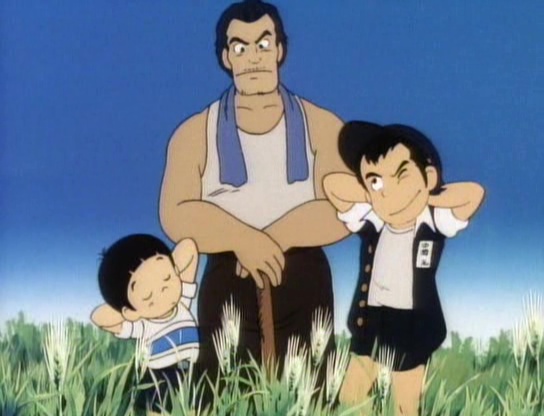
The movie very deliberately sets up the events leading up to that fateful moment by showing Shinji proudly holding the wooden boat that Gen has carved him and talking about how they are going to float it in the river when he gets home from school. His mother is on the balcony hanging clothes on the line, and the rest of the family is downstairs watching the curious phenomenon of ants streaming into their home.
Gen actually sees the Enola Gay fly overhead and comments on the fact that it’s weird for an American plane to be flying over during the day. He’s absentmindedly tossing a rock and catching it and the moment he bends over to pick it up is the moment that the bomb detonates.
I recall reading about Hiroshima and Nagasaki in various history classes, I’ve seen the black and white photographs of charred bodies, the silhouettes on blackened walls, even some gory pictures of the burns that some of the people suffered. I’ve never read an account of the atomic bomb dropping that has been treated as good, necessary maybe, but never good. I thought I had a correct handle on what happened in those cities but I didn’t.
The bombing scene is probably the most famous thing from Barefoot Gen, it’s extremely disturbing. It’s gory to be sure: eyeballs melt out of skulls, skin and hair burn off, bodies curl into purplish black husks. But what makes this scene so effective is the cross-section of victims that are chosen to be depicted: the first is a little girl, there’s an old man, a mother with a baby on her back who futilely tries to shield the infant from the blast. Shards of glass and pieces of wood impale men, women, and children. More people are crushed by debris. Gen’s mother is thrown off the balcony as their home collapses on her husband, Shinji, and the boys’ older sister.
And then the scene mercifully ends, Gen digs himself out of the rubble apparently unharmed and we’re lead to think that the worst is over. But then a procession of people walk by: burned, injured, melted flesh dripping from their bodies like candle wax, eyes missing. A horse runs up engulfed in flames and dies at Gen’s feet.
Gen rushes home to find his house in flames and his mother trying to free his siblings and father from the rubble. She and Gen try as hard as they can but they’re not able to move the debris and his father tells them to run as the house is engulfed in flames. We see Gen drag his hysterical mother from the home while his little brother screams for help and the flames rise higher.
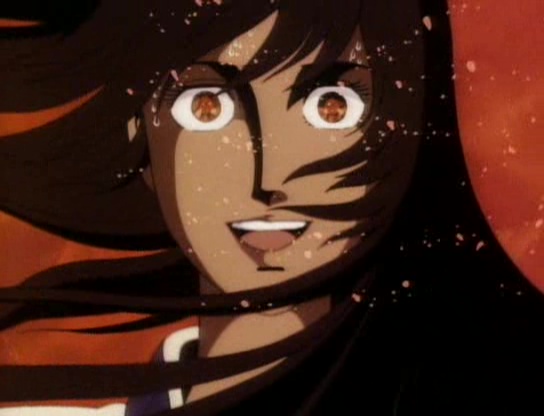
Shortly after the death of the rest of his family, Gen’s mother goes into labor. A doctor cannot be found so Gen manages to deliver the child, a girl, himself. Gen sets out of to find food for his mother and sister, stumbling upon a group of soldiers loading corpses on a truck. One of the soldiers is complaining of chills, bleeding profusely from the anus, and his hair is falling out in patches. Gen watches as he convulses and manages to build a makeshift stretcher to take him to the hospital where he finds out from the doctor there that the man is as good as dead of radiation poisoning. This seeds a later scene where Gen’s own hair starts falling out and he thinks that he’s going to die.
Gen chances upon a warehouse where he finds a large stockpile of rice which he takes to feed he and his mother. One night a young boy sneaks into their make-shift shack to steal food and is caught. The boy, Ryuta, is the spitting image of Gen’s little brother and he and his mother decide to adopt him into the family.
Gen and Ryuta go to find work so they can buy milk for their malnourished little sister. They get a job taking care of a belligerent injured man, reeking and covered in maggots and left all-but-abandoned in a backroom of his brother’s family’s house to die. The job is awful but they manage to make the most of it and get enough money to buy all the powdered milk they’ll ever need. They return home to tell their mother of the good news, only to find that the infant has died. Gen goes into a dreadful funk.
The movie ends on a note of optimism as Gen and Ryuta stumble upon some wheat sprouts growing from the scorched Earth. Gen flashes back to his father talking about how wheat thrives despite all the hardships it faces in growing and decides to put on a brave face for his future. He carves a boat just like the one he made for Shinji and he, Ryuta, and his mother go down to the river and set it in the water as it drifts away.
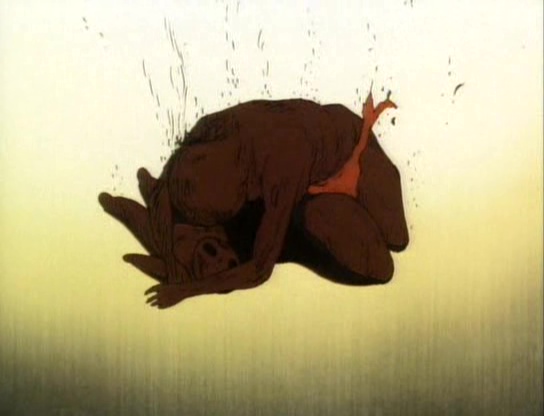
Barefoot Gen is a movie that is so good at thoroughly destroying me that I would accuse it of being manipulative if it wasn’t all true. Admittedly, it’s still a little manipulative, the movie makes sure to focus on the most innocent victims possible and it makes sure to show them suffering the most. It also likes to spread out the awfulness, filling in scenes of triumph that are cheesy and inspirational before bringing in another moment of pain.
The up-and-down quality of the narrative isn’t necessarily a good thing, though. Barefoot Gen has one of my biggest anime pet peeves where everyone’s just a bit too cheerful and animated in scenes where nothing overtly bad is happening. This movie is very stark and depressing but half the time I feel like I’m watching a Studio Ghibli movie meant for small children (I got a My Neighbor Totoro vibe during several scenes.) Gen himself is probably the worst about being perhaps a bit too happy. Admittedly Gen’s theme as protagonist is one of nearly-deluded optimism in the face of all the hellish things happening, but actor Issei Miyazaki just overacts like crazy.
It’s also difficult to tell what the time-frame is for this movie, I’m not sure if it’s meant to take place over the course of several months or only a few days. It’s unclear how long Gen is working the job with the injured man before he gets paid, it’s unclear how long after the blast his mother gives birth. Maybe this was a conscious decision as I’m sure for the people there it was unclear how long everything took as well, but it makes the action (such as it is) rather hard to follow.
I might also add that the art is rather weak. I’ve seen my share of animes and I might forgive the unpolished quality of Gen if it had been an episode of a show but with a movie they should’ve really had time to buckle down and do it right. My only assumption is that the film didn’t have a lot of money and they had to settle for less. It’s especially a shame compared to the art in the book.
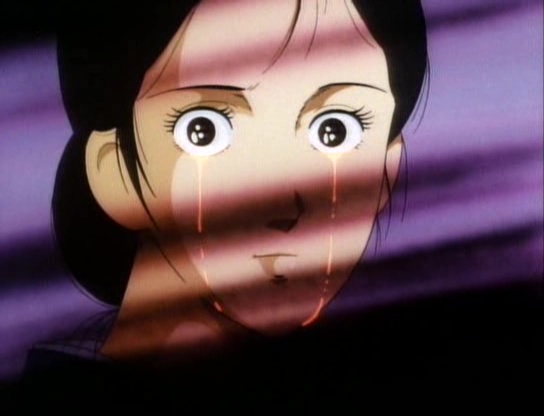
Of course, the real showcase of Barefoot Gen is the story itself. Keiji Nakazawa’s story is beautiful and sad and uplifting. Barefoot Gen will take away your faith in humanity and give back to you. It definitely makes you question how something like dropping a nuclear weapon on a civilian population center could ever be deemed right or necessary. I’m glad that people are pushing for this book to be given to schools, it should be a requirement to watch it before declaring war as well.
Nakazawa doesn’t make excuses for the American military for what they did but he does shoulder off quite a bit of the blame on the Japanese government for not surrendering when they had already lost the war (or when the first weapon had been dropped.) His father is painted as a staunch anti-imperialist who calls the people in power idiots for not giving up. I’m sure his father actual was how he is depicted in the film but considering the actions of Japan early on in the second world war, this is probably a good idea.
Ultimately the movie is quite good, and undoubtedly effective but it feels tonally confused at times, the art is kind of shoddy, and the acting isn’t especially great. One would probably be better off just buying the book.
THE SHILL
Barefoot Gen is not an easy movie to get hold of legally in America and beyond VHS you’re really just limited to an out-of-print (and ridiculously priced) DVD or various imports from other regions. The book (in various volumes) is very affordable and can be found easily.
NEXT TIME ON DOOMSDAY REELS
“Don’t you dare start stimulating, James. I’m not in the mood.”
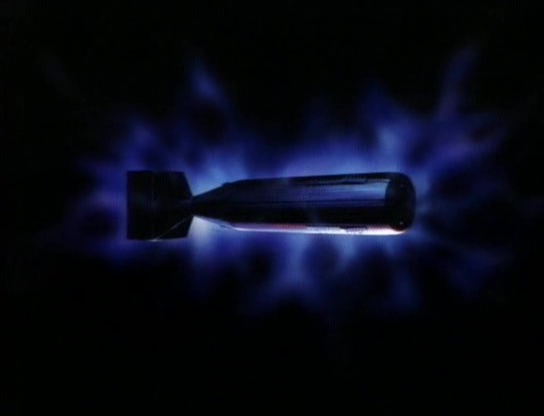
Discuss this and other Doomsday Reels columns in the forum.